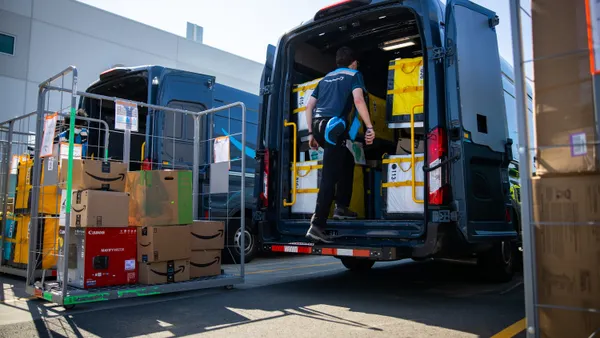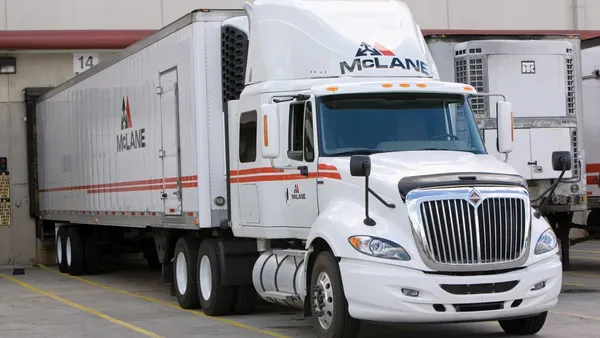Dive Brief:
- A lack of heavier parcels in Pitney Bowes’ network weighed on its financials in Q4, and the company is now shifting its focus to acquiring more volume in that weight class, President and CEO Marc Lautenbach said on a Jan. 31 earnings call.
- The average parcel weight the shipping and mailing company handles is 2.5 pounds, but near the end of the quarter, that weight fell closer to 2 pounds, Lautenbach said. Although lightweight parcels are still profitable, the imbalance depressed its revenue per piece.
- Pitney Bowes will start skewing its sales and marketing resources toward bringing in heavier parcels, Lautenbach said. He added that the company has a strong volume backlog fitting this criteria in its pipeline. "We just need to get that stuff into the network."
Dive Insight:
To keep profits healthy, parcel shipping providers must balance growing volumes with ensuring the average weight profile is well-suited for their networks. Heavier packages can take longer to process, clogging a facility's throughput. Whereas, lighter-weight packages typically aren't as profitable to handle and transport.
Pitney Bowes is facing issues on the lower end of the scale. Domestic parcel volumes increased 16% YoY to 54 million in Q4, but the mix of volume skewed toward lighter-weight parcels, particularly in December, Executive Vice President and CFO Ana Maria Chadwick said on the call. This resulted in lower revenue and margin per parcel than anticipated.
The company expected some downward pressure on its average parcel weight due to the volume characteristics of its new clients. But the larger issue was that it received less volume than anticipated from existing customers late in the quarter, according to Lautenbach. This pressured revenue per piece during that period, costing Pitney Bowes about $5 million.
"We still got more volume than we had the previous quarters and good performance, but we were expecting slightly more," he said.
Going forward, Pitney Bowes will place a higher degree of focus toward attracting heavier-weight parcels to strengthen its results. Lautenbach said the company will continue to pursue lighter-weight parcels as long as it has the necessary capacity, since they still provide an overall benefit to margins.
"Even at two pounds, it’s got a positive contribution margin to the overall business," he said. "So, it's not that we don't like [lightweight parcels]. It's just we've got to ensure that we get the right absolute number of higher weight parcels."
Executives said the company's pipeline of new clients is strong and features plenty of heavier parcels, which should benefit the company in 2023. Planned client implementations in Q1 are expected to run at nearly double the rate of implementations YoY, Chadwick said, adding that Q4's volume gains were promising.
"In the context of an industry that is projecting to be down, the 16% gain highlights that our services resonate with our clients," Chadwick said.













